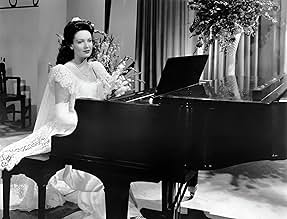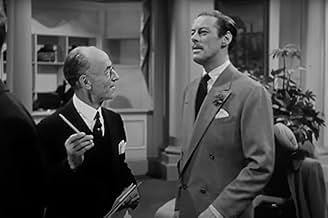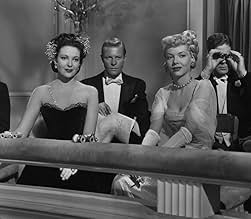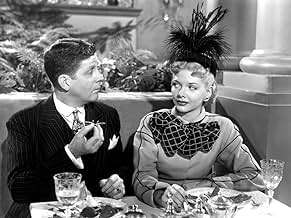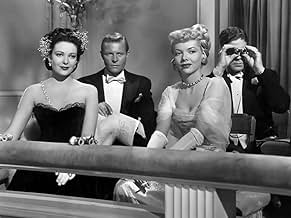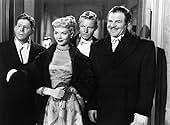IMDb-BEWERTUNG
7,4/10
6129
IHRE BEWERTUNG
Füge eine Handlung in deiner Sprache hinzuA man dreams of revenge when he suspects his wife is unfaithful.A man dreams of revenge when he suspects his wife is unfaithful.A man dreams of revenge when he suspects his wife is unfaithful.
- Auszeichnungen
- 1 wins total
Al Bridge
- House Detective
- (as Alan Bridge)
Abdullah Abbas
- Concert Attendee
- (Nicht genannt)
Pati Behrs
- Minor Role
- (Nicht genannt)
George Beranger
- Maître d'hôtel
- (Nicht genannt)
Evelyn Beresford
- Madame Pompadour
- (Nicht genannt)
Georgia Caine
- Dowager in Concert Box
- (Nicht genannt)
James Carlisle
- Concert Attendee
- (Nicht genannt)
Harry Carter
- Reporter
- (Nicht genannt)
Bill Cartledge
- Page Boy
- (Nicht genannt)
Empfohlene Bewertungen
Golden-Age Hollywood screwball fabricator Preston Sturges' last feature film worthy of his caliber, UNFAITHFULLY YOURS stars Rex Harrison as a renowned conductor Sir Alfred de Carter, on the eve of his concert, he is deviled by the paranoia that his much younger wife Daphne (Darnell) might have an extramarital affair with his personal secretary Anthony Windborn (Kreuger) thanks to his philistine brother-in-law August Henshler (Vallée)'s presumptuous misconstruction.
The apprehension and exasperation of being cuckolded hangs like a rock over Alfred's mind and Sturges only knows all too well, that for a man of Alfred's Brobdingnagian ego, the last thing to do is to lay bare his suspicion point blank in front of Daphne, from blunt rebuke to mounting curiosity, until firmly convinced by the circumstantial evidence, it all comes down to an increasingly fractious Alfred envisages three possible outcomes when wielding his baton in front of a full symphony orchestra and a full-house audience.
Every scenario is pertinently induced by a different classical piece from romantic-era he conducts and introduced by a cracking zooming-in shot right into Alfred's eyeball, the overture of Rossini's baroque SEMIRAMIDE triggers a murderous plan A which a framed Anthony to take the rap, yet what Wagner's operatic TANNHÄUSER suggests is a plan B with lenience and munificence, whereas plan C of a Russian roulette derring-do is influenced by Tchaikovsky's symphonic poem FRANCESCA DA RIMINI, a special treat for musos and cinephiles alike.
Sardonically, reality is, more often than not, not exactly what we have imagined, so during his execution of one of the plans after the concert (interestingly, the choice of the plan betrays Sturges' arch amalgamation of comedy and morbidness), a knockabout transpires in a slightly labored fashion which plays up to Alfred's clumsiness, and he is merely stuck in the preparatory step with the "so-simple-it-operates-itself" home recording unit when Daphne returns, thus an air-clearing finale is all we need to put everything back to the status quo.
A motormouthed Rex Harrison simulates a great impression as a conductor and relishes Sturges' long-winded screenplay which jollily throws barbs to the folly of machismo, meanwhile, Linda Darnell is hobbled as a virtuous beauty with a little more to act (albeit it is all in one's figment), yet, quintessentially it is Sturges' trademark witticism and sleight-of-hand that marks this oldie a treasure to be appreciated by posterity and here is the takeaway quip to round off my review - "If there is one reassuring thing about airplane, they always come down."
The apprehension and exasperation of being cuckolded hangs like a rock over Alfred's mind and Sturges only knows all too well, that for a man of Alfred's Brobdingnagian ego, the last thing to do is to lay bare his suspicion point blank in front of Daphne, from blunt rebuke to mounting curiosity, until firmly convinced by the circumstantial evidence, it all comes down to an increasingly fractious Alfred envisages three possible outcomes when wielding his baton in front of a full symphony orchestra and a full-house audience.
Every scenario is pertinently induced by a different classical piece from romantic-era he conducts and introduced by a cracking zooming-in shot right into Alfred's eyeball, the overture of Rossini's baroque SEMIRAMIDE triggers a murderous plan A which a framed Anthony to take the rap, yet what Wagner's operatic TANNHÄUSER suggests is a plan B with lenience and munificence, whereas plan C of a Russian roulette derring-do is influenced by Tchaikovsky's symphonic poem FRANCESCA DA RIMINI, a special treat for musos and cinephiles alike.
Sardonically, reality is, more often than not, not exactly what we have imagined, so during his execution of one of the plans after the concert (interestingly, the choice of the plan betrays Sturges' arch amalgamation of comedy and morbidness), a knockabout transpires in a slightly labored fashion which plays up to Alfred's clumsiness, and he is merely stuck in the preparatory step with the "so-simple-it-operates-itself" home recording unit when Daphne returns, thus an air-clearing finale is all we need to put everything back to the status quo.
A motormouthed Rex Harrison simulates a great impression as a conductor and relishes Sturges' long-winded screenplay which jollily throws barbs to the folly of machismo, meanwhile, Linda Darnell is hobbled as a virtuous beauty with a little more to act (albeit it is all in one's figment), yet, quintessentially it is Sturges' trademark witticism and sleight-of-hand that marks this oldie a treasure to be appreciated by posterity and here is the takeaway quip to round off my review - "If there is one reassuring thing about airplane, they always come down."
Rex Harrison comedy in films was mostly of the tongue and mind. He is known in most of his comedic roles for the witty quips, humorous repartee and funny dialog. While there's a smattering of that here, "Unfaithfully Yours" is mostly a departure from the normal Harrison persona. Here he is very funny for his antics and the fumbling, bumbling and pratfalls. He reminds one instantly of the Three Stooges and the Marx Brothers.
Is this a dark comedy, as some think? Is it about the complications of operating modern gadgets? Is it a classical musical in some sense? No, I don't think it's any of these. It's just a straightforward comedy about the foibles and problems that marital jealousy and distrust can cause. And it takes serious pokes at such jealousy in the fantasies that Harrison has after he becomes suspicious of his wife.
That his Sir Alfred De Carter might have dark daydreams about revenge or murder is offset quickly by the humorous situations that follow. And, what person hasn't at one time or another in life fantasized about getting even with someone, even by bumping them off? But only to laugh about such thoughts later? (There may be such a near perfect person or two, but even the best of my acquaintances have had such temptations in their lives.)
A scene with complicating instructions for operating a home recorder seems just a counterpoint to Carter's fantasy about how easy and simple it would be to carry out such a dream. And, the classical music - well that is just the venue in which all of this can develop, because the thought of bumping off his wife was just as horrible to Carter as classical music seemed to Preston Sturges in real life.
How do we know that? Because his wife, Sandy, tells us in an interview with the later DVD release of the movie. She says that Sturges "hated" classical music. He couldn't stand it. She said that they went to a concert one time in which he sat through the entire two-hour program. He railed against it afterwards, and Sandy said it led to his idea for this film. He would use the classical Mozart motif as a torturous undertone for the torturous fantasies brought on by jealousy. Only the humorous foibles would return Carter, the film and the viewers to normal for a spell.
So, classical music lovers, don't take it personally, but the classical music overtone for this film was not intended as a kudos to the genre. Rather, it served as a vehicle for the clever Sturges to concoct and carry out a fanciful revenge and knocking off of his wife. It's in the several different ways and times that he tries and fails that make this movie such a very good comedy. The ending says it all.
Personally, I enjoy classical as well as most forms of music. And I thought it served the purpose Sturges intended for this film and story quite well. All of the cast are very good, but this is a Harrison vehicle all the way.
Is this a dark comedy, as some think? Is it about the complications of operating modern gadgets? Is it a classical musical in some sense? No, I don't think it's any of these. It's just a straightforward comedy about the foibles and problems that marital jealousy and distrust can cause. And it takes serious pokes at such jealousy in the fantasies that Harrison has after he becomes suspicious of his wife.
That his Sir Alfred De Carter might have dark daydreams about revenge or murder is offset quickly by the humorous situations that follow. And, what person hasn't at one time or another in life fantasized about getting even with someone, even by bumping them off? But only to laugh about such thoughts later? (There may be such a near perfect person or two, but even the best of my acquaintances have had such temptations in their lives.)
A scene with complicating instructions for operating a home recorder seems just a counterpoint to Carter's fantasy about how easy and simple it would be to carry out such a dream. And, the classical music - well that is just the venue in which all of this can develop, because the thought of bumping off his wife was just as horrible to Carter as classical music seemed to Preston Sturges in real life.
How do we know that? Because his wife, Sandy, tells us in an interview with the later DVD release of the movie. She says that Sturges "hated" classical music. He couldn't stand it. She said that they went to a concert one time in which he sat through the entire two-hour program. He railed against it afterwards, and Sandy said it led to his idea for this film. He would use the classical Mozart motif as a torturous undertone for the torturous fantasies brought on by jealousy. Only the humorous foibles would return Carter, the film and the viewers to normal for a spell.
So, classical music lovers, don't take it personally, but the classical music overtone for this film was not intended as a kudos to the genre. Rather, it served as a vehicle for the clever Sturges to concoct and carry out a fanciful revenge and knocking off of his wife. It's in the several different ways and times that he tries and fails that make this movie such a very good comedy. The ending says it all.
Personally, I enjoy classical as well as most forms of music. And I thought it served the purpose Sturges intended for this film and story quite well. All of the cast are very good, but this is a Harrison vehicle all the way.
It is rare when a film is so funny that it will give me fits of belly laughter, and Unfaithfully Yours is one of them. Rex Harrison stars as an English aristocrat and eminent conductor who, despite being madly in love with his wife (played by Linda Darnell) realizes as a result of several misunderstandings that she may be cheating on him. While he is conducting a symphony concert he comes up with three different scenarios in his head of how to deal with her alleged duplicity. Actually carrying out these plans turns out to be an entirely different matter.
Preston Sturges is always an excellent writer and director, but his quick wit and double entendres are a revelation in this film. One almost has to watch it two or three times to get every comment uttered and facial expression portrayed by our protagonist (Harrison). His delivery is superb, sometimes almost funnier than the words he is saying. Darnell and the supporting cast provide excellent straight and slapstick moments. Dudley Moore starred in a remake of this film in the 80's which was also enjoyable, but having now seen this film, I highly recommend the original over the remake. It is an hour and a half of pure delight.
--Shelly
Preston Sturges is always an excellent writer and director, but his quick wit and double entendres are a revelation in this film. One almost has to watch it two or three times to get every comment uttered and facial expression portrayed by our protagonist (Harrison). His delivery is superb, sometimes almost funnier than the words he is saying. Darnell and the supporting cast provide excellent straight and slapstick moments. Dudley Moore starred in a remake of this film in the 80's which was also enjoyable, but having now seen this film, I highly recommend the original over the remake. It is an hour and a half of pure delight.
--Shelly
This film brings us Rex Harrison already foreshadowing Professor Higgins. He tries out the arrogant, picayune, verbally acute role and is absolutely successful. The seed is planted and we, who know what is to come twenty years hence, rub our hands gleefully in anticipation of Higgins. But Linda Darnell is no Eliza. Instead, she is a loving, docile, trusting wife, already dressed as though she will be meeting the Queen and looking beautiful and so very desirable.
The dialog crackles and moves fast. Only Rex Harrison and perhaps Cary Grant could have have delivered with the wit and brio that Sturges deserved.
There are two extended slapstick scenes that should have been cut shorter.
Edgar Kennedy as a Private Eye has a couple of great scenes when he turns out to be a classical music devotee and is knowledgeably enthusiastic about Harrison's conducting.
A digression: Harrison tosses a couple of tickets to the Philharmonic concert, they are orchestra tickets a few rows from the front row. Price $3.80, designated as "Patron"' seats.
The dialog crackles and moves fast. Only Rex Harrison and perhaps Cary Grant could have have delivered with the wit and brio that Sturges deserved.
There are two extended slapstick scenes that should have been cut shorter.
Edgar Kennedy as a Private Eye has a couple of great scenes when he turns out to be a classical music devotee and is knowledgeably enthusiastic about Harrison's conducting.
A digression: Harrison tosses a couple of tickets to the Philharmonic concert, they are orchestra tickets a few rows from the front row. Price $3.80, designated as "Patron"' seats.
I was surprised to see only one comment on this film in your files. It's been one of my all-time favorites since I was a youngster about the time it was made. Now that I'm reminded by looking it up here that it was a Preston Sturges film I can see why that's so. His classic comedies were unique. It must be also one of Rex Harrison's greatest films. Being a professional musician myself I can especially appreciate the symphonic ambience in which it takes place. I can also appreciate the possible parody Sturges might have had in mind of the great British conductor of those days, Sir Thomas Beecham. The greatest and most memorable visual effect of the movie (I've certainly remembered it all these years most vividly) happened when the Harrison character has to look up the directions for using the recording machine on which he was going to fake the evidence of his wife's still being alive. Onto the screen flashes the most outrageously complex electrical diagram comprehensible only to a professional electrician. This symbolized the inability of modern man to cope with advanced technology. One of the most hilarious moments in film I've ever seen. More viewers should catch up with this one.
Wusstest du schon
- WissenswertesThe camera zooms to a big close-up of Sir Rex Harrison's left eye just before fading to each of Alfred De Carter's infidelity fantasies. Harrison happened to be blind in that eye, the result of childhood measles.
- PatzerThe "recording machine" Rex Harrison was trying to use in his fantasy was not a recording machine at all but a Garrard RC-100 flip-over 1938 record changer.
- Zitate
Alfred: Have you ever heard of Russian Roulette?
Daphne De Carter: Why, certainly. I used to play it all the time with my father.
Alfred: I doubt that you played Russian Roulette all the time with your father!
Daphne De Carter: Oh, I most certainly did. You play it with two decks of cards, and...
Alfred: That's Russian Bank. Russian Roulette's a very different amusement which I can only wish your father had played continuously before he had you!
- VerbindungenEdited into Myra Breckinridge - Mann oder Frau? (1970)
- SoundtracksFrancesca da Rimini, Opus 32
(1876) (uncredited)
Music by Pyotr Ilyich Tchaikovsky (as Peter Ilystch Tchaikowski)
Played during the opening credits, at the concert and often in the score
Top-Auswahl
Melde dich zum Bewerten an und greife auf die Watchlist für personalisierte Empfehlungen zu.
- How long is Unfaithfully Yours?Powered by Alexa
Details
- Erscheinungsdatum
- Herkunftsland
- Offizielle Standorte
- Sprache
- Auch bekannt als
- Unfaithfully Yours
- Drehorte
- Produktionsfirma
- Weitere beteiligte Unternehmen bei IMDbPro anzeigen
- Laufzeit
- 1 Std. 45 Min.(105 min)
- Farbe
- Seitenverhältnis
- 1.33 : 1
Zu dieser Seite beitragen
Bearbeitung vorschlagen oder fehlenden Inhalt hinzufügen



